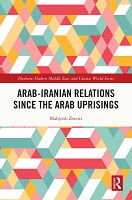Chapter 1 Why Studying Arab–Iranian Relations Matters
Proposal review
| dc.contributor.author | Zweiri, Mahjoob | |
| dc.date.accessioned | 2024-02-27T14:22:37Z | |
| dc.date.available | 2024-02-27T14:22:37Z | |
| dc.date.issued | 2024 | |
| dc.identifier.uri | https://library.oapen.org/handle/20.500.12657/88040 | |
| dc.description.abstract | Unlike most writing on Arab-Iran relations, which looks at specific episodes and specific countries, this book, taking a long term view, assesses the overall dynamics of the relationship, discussing in particular how far religion or politics drives the relationship. It argues that although Iran asserts that religion is a key factor underpinning a coherent approach to international relations, in fact what turns out to be the key factor is the politics of particular circumstances and Iran’s specific interests. The book considers Iran’s differing reactions to the Arab uprisings of 2011 onwards, showing that while Iran supported the uprisings in some countries it sided with repressive governments in other countries. The book also examines Iran’s reaction to its own outbreak of popular discontent in 2009 which was controlled by what has been considered as severe repression and explores how Iran is viewed by ordinary people in different Arab countries. | en_US |
| dc.language | English | en_US |
| dc.subject.classification | thema EDItEUR::J Society and Social Sciences::JB Society and culture: general::JBS Social groups, communities and identities::JBSL Ethnic studies | en_US |
| dc.subject.classification | thema EDItEUR::J Society and Social Sciences::JH Sociology and anthropology::JHB Sociology::JHBC Social research and statistics | en_US |
| dc.subject.classification | thema EDItEUR::G Reference, Information and Interdisciplinary subjects::GT Interdisciplinary studies::GTM Regional / International studies | en_US |
| dc.subject.other | Arab Iranian Relations,Pahlavi Script,Arab Uprisings,Persian Language,Sassanian Empire,Islamic Revolution,Iranian Foreign Policy,Arabic Script,Islamic Republic,GCC State,Palestinian Muslim Brotherhood,Muhammad Ibn Abd Al Wahhab,Arabic,Arabic Language,Arab Muslim Army,Political Islam,Middle Eastern Region,Syrian Muslim Brotherhood,Iran Iraq War,Shia Iraqi Government,Supreme Leader,Iran’s Support,Iraqi National Congress,Arab States,Vice Versa | en_US |
| dc.title | Chapter 1 Why Studying Arab–Iranian Relations Matters | en_US |
| dc.type | chapter | |
| oapen.identifier.doi | 10.4324/9781003346111-2 | en_US |
| oapen.relation.isPublishedBy | 7b3c7b10-5b1e-40b3-860e-c6dd5197f0bb | en_US |
| oapen.relation.isPartOfBook | 5b7b545a-683b-4fd6-aaa0-7e196fa5a52c | en_US |
| oapen.relation.isbn | 9781032386539 | en_US |
| oapen.relation.isbn | 9781032386553 | en_US |
| oapen.imprint | Routledge | en_US |
| oapen.pages | 37 | en_US |
| peerreview.anonymity | Single-anonymised | |
| peerreview.id | bc80075c-96cc-4740-a9f3-a234bc2598f1 | |
| peerreview.open.review | No | |
| peerreview.publish.responsibility | Publisher | |
| peerreview.review.stage | Pre-publication | |
| peerreview.review.type | Proposal | |
| peerreview.reviewer.type | Internal editor | |
| peerreview.reviewer.type | External peer reviewer | |
| peerreview.title | Proposal review | |
| oapen.review.comments | Taylor & Francis open access titles are reviewed as a minimum at proposal stage by at least two external peer reviewers and an internal editor (additional reviews may be sought and additional content reviewed as required). |

